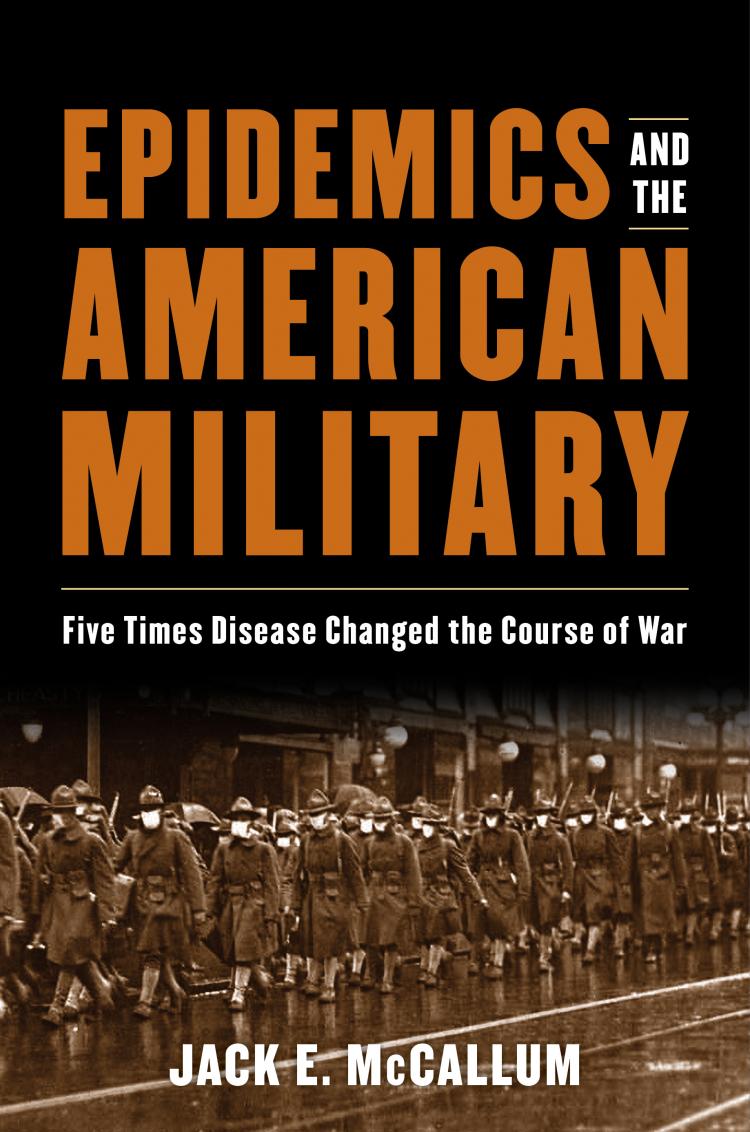Epidemics and the American Military
- Subject: Fall 2023 Catalog | General Military & Naval History | Society of Military History Conference
- Format:
Hardcover
- Pages:
288pages
- Illustrations:
8 b/w photos; 4 maps
- Published:
September 15, 2023
- ISBN-10:
1682477304
- ISBN-13:
9781682477304
- Product Dimensions:
9 × 6 × 1 in
- Product Weight:
20 oz
Overview
In Epidemics and the American Military, Dr. Jack McCallum examines the major role the military has played in both propagating and controlling disease throughout this nation’s history. The U.S. armed forces recruit young people from isolated rural areas and densely populated cities, many of whom have been exposed to a smorgasbord of germs. After training and living in close contact with each other for months, troops are shipped across countries and continents where they meet civilians and other armies. McCallum argues that if one set out to design a perfect world for an aggressive pathogen, it would be hard to do better than an army at war.
There are four ways to combat epidemic infectious diseases: quarantine, altering the ecology in which infections spread, medical treatment of infection, and immunization. Each has played a specific but often overlooked role in American wars. A case can be made that Gen. George Washington saved the American Revolution when he mandated inoculation of the Continental Army with smallpox. The Union Army might very well have taken Richmond in 1862 had it not been for an epidemic of typhoid fever during the Peninsular Campaign. Yellow fever was a proximate cause of the American invasion of Cuba in 1898, and its control enabled a continued U.S. presence on the island and in the rest of the Caribbean. Had it not been for influenza, German general Erich Ludendorff might well have succeeded in his offensive in the closing years of World War I. Before senior Army and Navy officers recognized the importance of anti-malarial prophylaxis and forced its acceptance by hesitant troops, the World War II Solomon and New Guinea campaigns were in danger of collapsing. Through his detailed exploration of these five conflicts, McCallum has shown how diseases can devastate troops during wartime.
About the Author
Editorial Reviews
"In this compelling book, Dr Jack McCallum shines a bright light on the ancient union of war and disease. From smallpox in the American Revolution to malaria in World War II, milestone events in the U.S. military’s encounters with infectious diseases and their control are explored in rich and candid detail. Scholarly and engaging in equal measure, this book is essential reading for anyone with an interest in the epidemiological history of war."—Matthew Smallman-Raynor, University of Nottingham, author of War Epidemics: An Historical Geography
“From the Revolutionary War through World War I, diseases have killed more American combatants than weapons of war. Epidemics have emanated most often from “sanitation failures” and infectious and insect-borne illnesses. The role of epidemics in U.S. military campaigns has been previously chronicled but not in such graphic detail as in Epidemics and the American Military. Jack McCallum’s mastery of military history, as well as his knowledge of disease, makes this a compelling and fascinating narrative from a physician’s unique perspective.”—Jan K. Herman, author of Battle Station Sick Bay: Navy Medicine in World War II and The Lucky Few: The Fall of Saigon and the Rescue Mission of the USS Kirk
“McCallum makes a powerful case for the centrality of disease in the outcome of many of America’s wars. He has astutely selected five campaigns to demonstrate that microbes are often more lethal to soldiers than conventional weapons. Possible strategies to suppress these epidemics are elucidated. His well argued and highly accessible work is required reading for those with any interest in American military and medical history.”—Martin R. Howard, author of The Fevered Fight: A Medical History of the American Revolution 1775–1783
"McCallum’s approach, tackling the topic of epidemics and wars, builds upon past works while providing new information and insights. He focuses upon the “weapons” historically used to control epidemics, thereby bringing new understanding to the examination of specific epidemics and conflicts. McCallum’s success in connecting his work to the recent Covid pandemic adds relevance that makes this work germane to a broad audience, attracting the interest of professional and amateur historians, and even those not typically drawn to historical research."—Rebecca Seaman, Editor of Epidemics and War: The Impact of Disease on Major Conflicts in History



